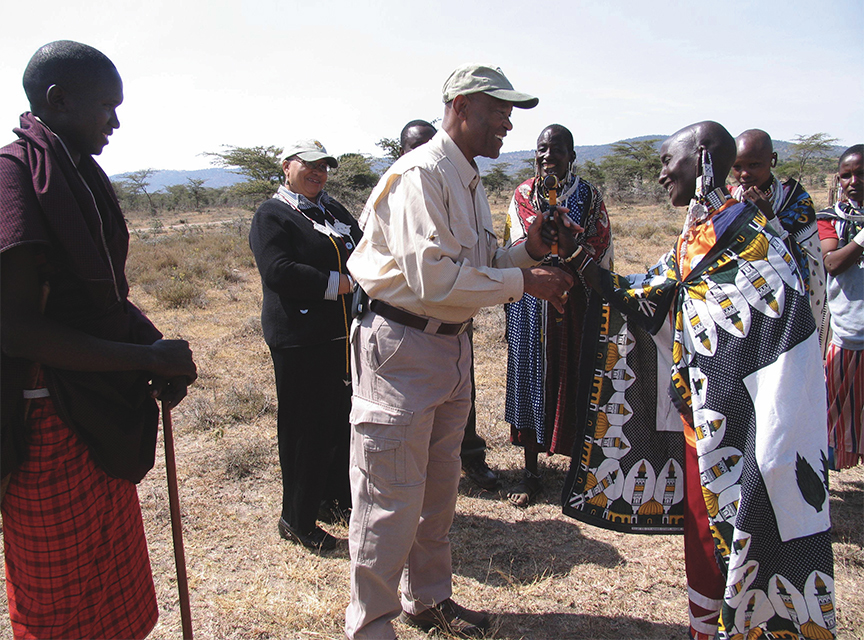
Alfonso "Al" Lenhardt ’76 is a very busy man – and a very happy one. Married for 45 years to his wife, Jacqueline, he’s the proud father of three daughters as well as grandfather – and here’s where, even on the phone, it’s almost possible to see him beam – “to three beautiful grandchildren.”
But a happy man isn’t necessarily a contented one: Lenhardt is always looking forward to new horizons. And he looks to the horizon these days from Tanzania.
To say he has a great deal to be proud of would be a gross understatement, and that certainly encompasses his professional life. A native of New York City, Lenhardt has managed to see quite a bit of the world. He was attending Pace University in 1965 when he dropped out to marry his wife.
Just a week later he received his draft notice to serve in Vietnam, after which he received the Purple Heart, the Bronze Star, the Legion of Merit Medal and the Distinguished Service Award, among others. A lengthy career in the U.S. Army followed; he eventually retired as a two-star general. He also found time to resume his education, and he received a bachelor’s degree in criminal justice from the University of Nebraska, the MA degree in public administration from Central Michigan University and the MS degree in administrative justice from Wichita State.
Also included in his educational repertoire is the completion of post graduate studies at Harvard University’s Kennedy School of Government and the University of Michigan’s Executive Business School. Has the phrase “no moss grows on a rolling stone” come to mind yet?
Then, after a career involving myriad roles in U.S. government, he was appointed Sept. 4, 2001 to serve the U.S. Senate as sergeant of arms, the first and only (thus far) African American to hold that position. After the attacks of 9/11, he played key roles in helping ensure the safety of fellow federal staff members, notably during the response to the October 2001 anthrax attack in the Hart Senate Office Building.
In 2005, Lenhardt became president and CEO of the National Crime Prevention Council (one of its more recognizable icons is McGruff the Crime Dog), and he firmly embraced and stood by his motto that law enforcement and community partners must work together to fight crime. His many accomplishments during his five years with the NCPC include an award-winning initiative to combat cyber-bullying.
It was June 12, 2009, when President Barack Obama announced his intention to nominate Lenhardt as the U.S. Ambassador to the United Republic of Tanzania. After Lenhardt’s appointment, as well as the appointments of others, Obama said, “Americans will be fortunate to have these distinguished men and women as their representatives abroad. Their talent, experience and dedication will be invaluable as we continue to strengthen America’s partnerships around the world and confront the challenges of the 21st century.”
Lenhardt was honored, excited and humbled by this honor, but, he adds with a laugh, prior to his confirmation, which required testimony before the Senate, “it occurred to me I was testifying about a place I’d never actually seen.”
Although Tanzania was a land unseen for Lenhardt at the time, he was anything but underprepared for the job. In his statement before the Senate Foreign Relations Committee, he explained, “My training and experience in local and international law enforcement has prepared me for some of the challenges I would likely face in Tanzania. In particular, my experience in adhering to the rule of law in police operations and crime prevention will be helpful in my engagement with Tanzanians … Tanzania exerts a positive influence for peace and democracy in Africa. The country has a long history of actively promoting conflict resolution in the region, including through its membership in (various) regional organizations … If confirmed, I will encourage Tanzania’s leaders to continue their support for democratic governance, tolerance and peaceful conflict resolution on the continent.”
People to People
Located in eastern Africa, Tanzania borders the beautiful blue-green waters of the Indian Ocean. The country it is today has its origins in the former individual states of Tanganyika and Zanzibar, which were united in 1964 to become the United Republic of Tanganyika and Zanzibar, which became simply the United Republic of Tanzania later that same year.
“The people are first and foremost Tanzanian rather than tribalistic,” Lenhardt says, referring to such tribes as the Maasai, the Hadzabe, the Datoq, among many others – more than 120. “The people are very gracious and polite,” he continues, “and the government is very stable and democratic, whereas it used to be socialist. This is a wonderful period. The concept of ‘people to people’ – that’s what Tanzanians understand. This isn’t a complex concept. From what I’ve experienced, they are an extremely friendly and peace-loving people, and we need to keep the focus on working together: people to people.”
Tanzania is a country rich in natural resources, including oil, gas, gold, diamonds and uranium deposits. While its economy isn’t struggling as badly as it did during the 1970s, the nation is still one of the 10 poorest countries in the world. The average working person makes the equivalent in U.S. dollars of $1.50 per day. “There are tremendous resources that aren’t being taken advantage of,” Lenhardt observes.
“The resources aren’t being developed, or harnessed to work for them. We can’t destroy what we have. We have to enhance what we have, and the United States can help be a part of that for Tanzania.”
Basic health issues are also a source of concern for the Tanzanian people, and combating health pandemics such as tuberculosis, HIV and AIDS is an ongoing battle. But strides in these areas are being made, thanks in part to assistance from organizations such as the Peace Corps and the Tanzanian people themselves.
“Four years ago the infection rate for HIV was over 8 percent,” Lenhardt says. “Now it’s down to 5.7 percent. We’ve worked together to drive hiv infection down 3 percent. That’s huge. The malaria infection rate used to be 27 percent. Now it’s less than 1 percent. Most people don’t realize that there are more deaths here from malaria than from complications of hiv, especially among children and pregnant mothers. Think of it this way: each decimal point represents a human life, and every life is important. There are many U.S. people here helping to save lives, and we’re helping Tanzania to preserve its future.”
Thumbs Up
Because Tanzanians are so friendly and outgoing, something they often signal with the familiar thumbs-up gesture, Lenhardt isn’t surprised that polls show 93 percent of them view America positively.
Yet while Tanzania is one of the larger countries in Africa (its land-mass is roughly the size of Texas and Missouri combined), the sentiments of its people toward the United States aren’t always shared across the continent. “There are some places where people will throw rocks at you rather than give you the thumbs-up,” Lenhardt says.
Continually impressed by Tanzania’s people, especially how prone and patient they are to work with government and government workers, Lenhardt is pleased with his experiences to date – and has some encouraging words for career-seeking Shockers on the cusp of graduation. “I’d recommend they consider a career in diplomatic foreign service,” he says. “The quality of the students at Wichita State would fit in well in this capacity.”
He also notes there are all kinds of opportunities for making a difference. “Don’t worry about the stuff you can’t control,” he counsels. “Worry about what you can contribute.” Lenhardt, who oversees a staff of more than 450, including locals, adds, “We’re building an infrastructure. For instance, only 14 percent of this country has electricity. We’re helping to enhance that. This is what the American people are doing. We’re not ‘getting’ anything in return, but we do want strategic partners. Africa is important not only to the United States, but to the world.”
Even over the phone, you can see the ambassador is looking toward new horizons.






